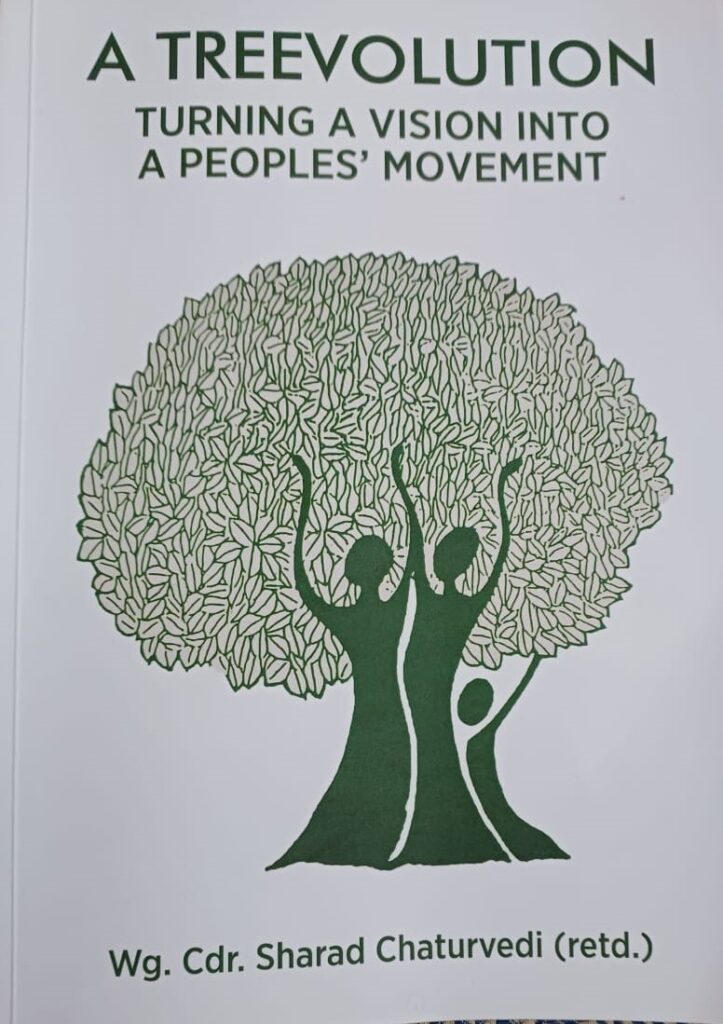Book review by my dad, K.S. Loganathan
The scrapbook memoir is the reflections of an airforce Wing Commander Sharad Chaturvedi who took early retirement in 1989, after 26 years of service, to become the Executive Director of a Kansas-based nonprofit organization called Trees for Life International. The organization began in India with the planting of fruit trees for reforestation projects in rural areas and training people to take care of them. Although Chaturvedi had no prior experience in the field, he had seen enough tree felling and denudation of forest land occur near airbases and in aerial views to be enthused about a green project. Corporate sponsorships were available for peripheral villages around their rural factories. Chaturvedi would continue in environmental projects until his retirement in 2000.
The book is profusely illustrated with old photographs, reproduction of newsletters and media clippings, letters of recommendation, etc., to substantiate every assertion in the text, even where a reference would have sufficed. All projects are described in detail and the names of major contributors are mentioned. The noteworthy contribution of the author lies in convincing the villagers and schoolchildren of the benefits of tree planting. Although initially, the rural folk were skeptical, mired as they were in poverty and suffering from malnutrition, they began to show interest in maintaining nutritional fruit-bearing trees in barren areas and kitchen gardens for growing vegetables, which would supplement their daily diet and get an income from any surplus sold in the market. In drought-prone areas, corporate sponsorships helped to sink tube wells and undertake rainwater or spring harvesting. Support by way of providing seeds and saplings and training was usually enough to get the project started: help in plant disease control was enough to sustain interest, while an excess of funds could likely divert the beneficiaries’ attention to less desirable activities.
Another innovative approach by a colleague Mrs Geetha Chopra, amplified the scale of the model to distribute saplings to large religious gatherings such as the Kumbh Mela or Magh Mela as ‘Prasad ‘, thus combining religious beliefs with sound ecology. A similar program was organized with funding by H.H. the Dalai Lama, drawn from his Nobel Peace Prize money, to offer Prasad in the form of fruit tree seeds to 400,000 devotees at the Kalachakra convention at Sarnath in 1990. In his typical humorous style, the Dalai Lama warned that the walnuts were for planting, and not for eating! He highlighted that the deforestation and introduction of various chemicals into the environment, and treewood use as fuel, had led to irregular rainfall and global warming, which had even resulted in the melting of perennial snow mountains.
A beekeeping project was successful in Tenali, by supporting a women’s self-help group with advanced loans and technical know-how, but another project to introduce an Italian bee species was unsuccessful. For a complete restoration, rewilding of vanishing animal species should go hand in hand with greening, so that both communities and wildlife can flourish. Another novel idea was adopted in the Voltas project which brought critical medical services to rural areas in a hospital train. Saplings were distributed to the patients upon discharge, along with instructions. The idea was subsequently extended to other developing countries.

Chaturvedi also undertook tree planting projects at airforce stations and in the nearby villages with the help of the Air Force Wives Welfare Association. In one of his last assignments at Haridwar, he introduced the Japanese 5S system awareness campaign to 80 ashrams and 40 schools to promote cleanliness in places of work and worship. In his retirement, he and his wife Veena took several trips abroad and he engaged in his favorite sports and pastimes.
All of his engagements were with the private sector, although in a few projects, governmental support was available. A Public-private Partnership model would have ensured continuity in building trust with the citizenry and sustainability in the long term. Nevertheless, his achievements as an individual have been outstanding and he deserved recognition for the awards for which he was nominated but did not receive at the time.
My views
How have we reached this situation of environmental degradation and climate change even as the masses struggle to eke out a livelihood, and some in desperation, take to arms and illicit activities? In my opinion, it is the overconsumption of natural resources, wasteful practices, and growing inequalities that are largely responsible and have brought us to this pass. Corporations and governments only do what the public expects them to do – provide for their wants. It is the wants that must be curtailed. Take a simple example: I am a voracious reader and an avid collector of books. This is a good habit, no doubt, and it feels good to be knowledgeable and scholarly. But I have also realized that in the process, I have consumed 70 tonnes of wood, the equivalent of 120 full-grown teak trees. In keeping with our culture to replenish what we consume, and pay forward any gifts we receive, I have planted 65 trees and brought them up to at least six feet in height, over the years until land for planting and other resources ran out. Think how difficult it is to restore the natural order if all human activity on the planet is considered. On page 212 of the book, there is an example of how to make saving paper a permanent habit, a practice Gandhiji advocated in his time. If each of us takes note of our carbon footprint and restrains our impulse to overindulge, some order may be restored in time. From that standpoint, this detailed playbook will be useful in spreading awareness of environmental practices. A laudable effort by one man, for a larger cause.











